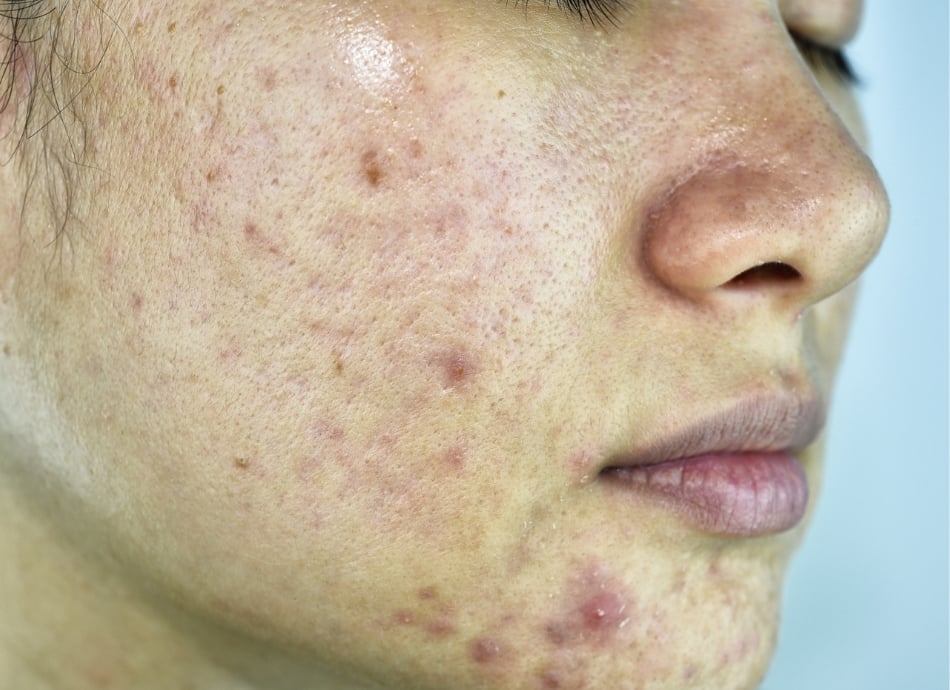You can now add Healthify as a preferred source on Google. Click here to see us when you search Google.
Benzoyl peroxide
Sounds like 'BEN-zoh-il per-OX-ide'
Key points about benzoyl peroxide
- Benzoyl peroxide is used to treat acne. It comes as a gel and a wash.
- Benzoyl peroxide is commonly called Benzac AC®
- Find out how to apply it safely and possible side effects.

Benzoyl peroxide is used to treat mild to moderate acne (blackheads, whiteheads, pimples). It works by killing the germs (bacteria) that cause acne, and softens and removes outer layers of the skin. It also reduces redness, soreness and inflammation and helps to unplug blocked pores.
Benzoyl peroxide is commonly called Benzac AC®. Read more about acne.
You can buy benzoyl peroxide without a prescription at a pharmacy. In Aotearoa New Zealand benzoyl peroxide comes as a gel in different strengths (2.5%, 4%, 5% and 10%) and a 5% wash.
Gels are more suited to oily skin. A wash is more convenient for treating acne affecting your back and chest and is more suitable if irritation occurs.
Ask your healthcare provider for advice on the strength of product that's best for you. The following is a guide:
- The lower strengths are sufficient for most people and cause less skin irritation than the higher 10% strength
- It's best to start treatment with the lower strength, especially if you have sensitive skin. If necessary, you can increase the strength gradually.
Benzoyl peroxide is also available in combination with other medicines, eg, Clearasil Ultra®, Duac® and Epiduo®.
- The wash can be used once or twice a day. Leave on your skin for 30 seconds before rinsing thoroughly.
- Apply the gel to the affected area as a thin layer once daily in the evening.
- When you start using the gel, for the first 3 days apply it for a short time (about 2 hours), then wash it off.
-
If your skin tolerates this, without irritation, then apply the gel once daily in the evening. Leave it on your skin overnight and wash it off in the morning.
- Some people may tolerate twice daily applications.
- Make sure your skin is clean and dry before applying. It can be used on your face as well as your chest and back.
- As you apply benzoyl peroxide, try to avoid getting it on sensitive areas such as on the skin in or around your nostrils, your eyes and your mouth.
- Don't apply it to any skin that's broken, irritated or sore.
- Do you have a skin problem other than acne, such as eczema?
- Are you taking or using any other medicines? This includes any creams or medicated soaps you're using that are available to buy without a prescription.
- Have you ever had an allergic reaction to a medicine?
If so, it’s important that you tell your healthcare provider before you start using benzoyl peroxide. Sometimes a medicine isn’t suitable for a person with certain conditions or it can only be used with extra care.
Here are some things to know when you're using benzoyl peroxide. Other things may be important as well, so ask your healthcare provider what you should know about.
- Benzoyl peroxide bleaches clothing and hair. Make sure the benzoyl peroxide has completely dried before the treated skin touches clothes or bedding.
- Wash your hands well after using it.
- Protect your skin from sunlight and other UV light. Use a high SPF factor sunscreen during the day.
- Don’t use cosmetic products containing alcohol, scrubs, or medicated soap.
- Get advice from your healthcare provider about moisturisers and check if other products you want to use are suitable.
- If your skin peels or becomes very dry, use an oil-free moisturiser.
- Acne responds very slowly to treatment, so it may take several weeks to months to notice improvement.
Like all medicines, benzoyl peroxide can cause side effects, although not everyone gets them. Often side effects improve as your body gets used to the new medicine.
| Side effects | What should I do? |
|---|---|
|
|
|
|
Read more about medicines and side effects and reporting a reaction you think might be a side effect.
Benzac AC(external link) Medsafe, NZ
Benzoyl peroxide(external link) Dermnet, NZ
Apps
References
- Benzoyl peroxide(external link) New Zealand Formulary
- Managing acne in primary care(external link) BPAC, NZ, 2013
- A topical issue – serious hypersensitivity and burning reactions Medsafe, NZ, 2015
Brochures

Medicines and side effects
Healthify He Puna Waiora, NZ, 2024

Health Quality and Safety Commission, NZ, 2019 English, te reo Māori
Credits: Healthify editorial team. Healthify is brought to you by Health Navigator Charitable Trust.
Reviewed by: Stephanie Yee, Pharmacist, Auckland
Last reviewed:





